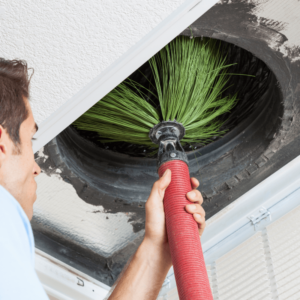Air ducts are the respiratory system of your home. They circulate air from your heating and cooling systems, ensuring you enjoy consistent indoor comfort regardless of the season. Over time, these ducts can accumulate dust, pet dander, pollen, and even mold. This might raise the question, “How often should I clean my air ducts?” The answer isn’t as straightforward as you might think.
In this blog post, we’ll dive deep into the importance of air duct cleaning and its recommended frequency.
Why Clean Air Ducts?
Before we discuss the frequency of cleaning, it’s essential to understand why it’s important:
- Improved Air Quality: Clean air ducts reduce the allergens and pollutants circulating in your home. This is especially beneficial for those with respiratory issues or allergies.
- Efficient System Performance: Dust and debris can restrict airflow, making your HVAC system work harder. A clean system runs more efficiently, saving you on energy costs.
- Prevents Mold Growth: In areas with high humidity, there’s a risk of moisture buildup in the ducts, which can be a breeding ground for mold.Eliminates Odors: A clean air duct system reduces musty odors often associated with mold, dust, and mildew.
So, How Often Should You Clean Your Home Air Ducts?
Experts suggest having your air ducts inspected every two years. However, when it comes to actual cleaning, the frequency can vary based on various factors:
- If you live in a typical home without any extraordinary circumstances (like pets that shed heavily, smokers, recent renovations, etc.), cleaning your air ducts every 3-5 years is generally sufficient.
- If you’ve recently had a home renovation or construction, especially if it involved asbestos abatement, lead paint removal, or significant dust, it’s advisable to clean the ducts once the project is finished.
- Unless you’re certain the previous homeowners cleaned the air ducts recently, it’s also wise to have them cleaned upon moving in.
- Those with severe allergies might benefit from more frequent cleanings, perhaps every 2-3 years. If you detect mold growth inside your ducts or on other components of your HVAC system, it’s crucial to have them cleaned immediately.
- Rodent or insect infestations can leave droppings in your ducts. In such cases, it’s vital to clean them once the infestation has been addressed.
Need air duct cleaning service in Orlando? Click here
Need air duct cleaning service in Tampa? Click here
5 Warning Signs That You Might Need Immediate Cleaning
While the above guidelines provide a general timeline, some signs might indicate the need for immediate cleaning:
- Dust is blowing out from the vents when the HVAC system operates.
- The airflow is not as strong as it used to be, indicating possible blockage.
- Your home takes longer to heat up or cool down.
- A musty or stale odor persists when the HVAC system runs.
- You or your family members experience unexplained respiratory problems or allergies.
Orlando and Tampa, FL, Air Duct Cleaning Schedule
| Factors Influencing Cleaning | Recommended Cleaning Frequency |
|---|---|
| Standard Household | Every 3-5 years |
| Households with Pets | Every 2-4 years |
| High Allergen Levels | Every 2-3 years |
| Smokers in Household | Every 2-3 years |
| Recent Home Renovations | Immediately after completion |
Factors Affecting the Accumulation of Debris in Air Ducts
Different homes might accumulate debris in their air ducts at different rates based on several influencing factors. Urban homes might gather more pollutants due to external environmental factors, while homes in more rural settings might have more pollen or organic debris. Let’s look at some of these factors:
- Location of the Home: Homes located near highways, construction sites, or industrial areas may require more frequent cleaning due to higher amounts of particulate matter.
- HVAC Usage: Homes, where the HVAC system is used extensively (like in extreme climates), might accumulate debris faster.
- Type of Air Filters Used: High-efficiency air filters trap more particles, potentially reducing the rate of duct contamination, while low-efficiency filters might do the opposite.
Read More: How to fix disconnected air duct
Self-Service Duct Maintenance
- Cleaning of both return and supply duct ends.
- Shifting debris towards air vents.
- Partial extraction of ductwork debris.
- Costs range from $50 to $100.
Expert Duct Cleaning Services:
- Comprehensive cleaning of all ductwork.
- Debris directed towards the HVAC system.
- Complete removal of debris from ductwork.
- Price varies between $450 to $1,000.

Maintenance Between Cleanings: Ensuring Prolonged Air Duct Health
While it’s imperative to get your air ducts professionally cleaned every few years, taking care of them in the interim can extend the time between cleanings and ensure your home’s air remains fresh and clean. Proper maintenance between cleanings can save you money and maintain the efficiency and longevity of your HVAC system.
Do a visual check. Every few months, remove a vent cover and do a visual inspection using a flashlight. Look out for any excessive dust buildup, mold, or signs of pests.
Regularly dusting surfaces and mopping floors can further reduce the amount of particulate matter available to be sucked into your HVAC system.
Ensure you’re using the best quality air filters for your HVAC system that’s within your budget. These filters trap particles, preventing them from entering the duct system. Check them monthly and replace them when they appear dirty or every 3 months, whichever comes first.
In Conclusion
Air duct cleaning might not be the first thing on your home maintenance checklist, but it plays a crucial role in ensuring a healthy living environment and the efficient performance of your HVAC system.
While every 3-5 years is a general guideline, always be attentive to the specific needs of your home. Regular inspections and being aware of the signs of dirty ducts can help you breathe easier and live more comfortably.

